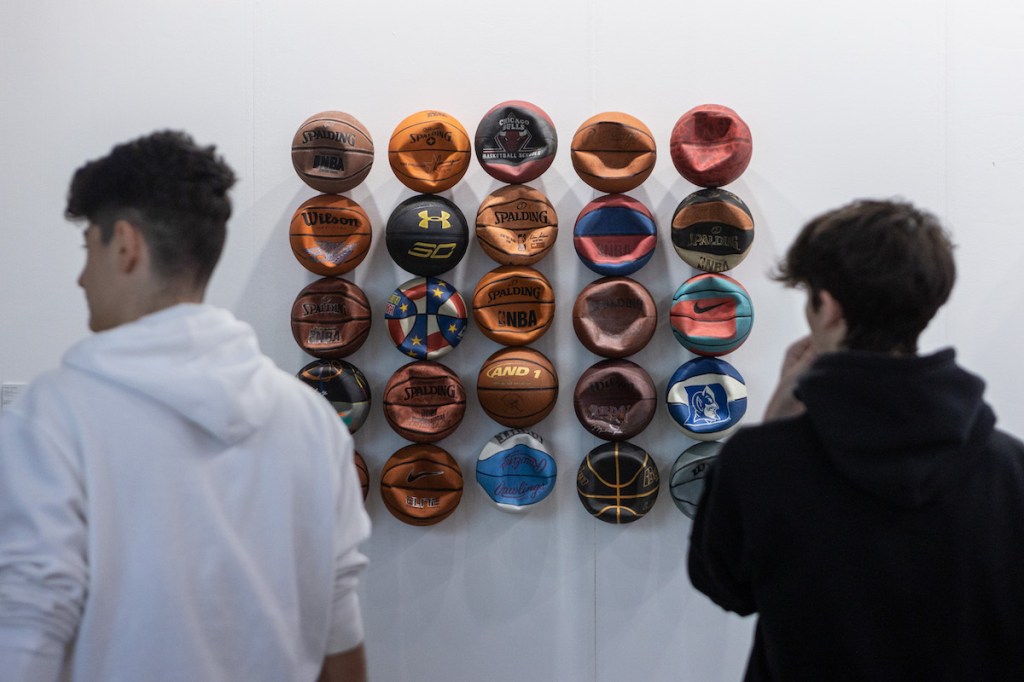Visual artist Tyrrell Winston, whose “signature use of found, deflated basketballs” has garnered him acclaim—and, he says, contracts with NBA owners—sued the New Orleans Pelicans on Wednesday for copyright infringement.
Winston’s beef centers on Pelicans’ Instagram posts showing New Orleans players in front of deflated basketballs that Winston contends are “substantially similar” to his copyrighted work.
Drafted by Vivek Jayaram of Jayaram Law, Winston’s complaint maintains his basketball wall sculptures have been exhibited in major galleries and museums across the world. Shows in New York, Los Angeles, Detroit, Paris, Tokyo, Stockholm, Brussels, Hong Kong, Seoul and Athens are mentioned. Winston also refers to the licensing of his designs in deals with Nike, Adidas and other major brands.
Related Articles

Winston further says the influence and “cultural legitimacy” of his work in the basketball community is extensive. Retired San Antonio Spurs star and Naismith Memorial Basketball Hall of Fame inductee Tony Parker is described as an enthusiastic fan. In Parker’s more recent role as “art advisor,” he has allegedly “spoken about the profound impact Mr. Winston’s work has had on him.”
Winston also refers to being commissioned by Cleveland Cavaliers owner Dan Gilbert to produce large-scale sculptures that include “a grid composed of 168 flattened basketballs.” The Cavaliers’ home venue, Rocket Arena, allegedly features Winston’s work.
Winston’s NBA ties go even deeper, at least as told by the complaint. Detroit Pistons owner Tom Gores is mentioned as purchasing Winston’s work and displaying it in a Pistons facility. Winston also stresses that his art was selected for display at NBA All-Star Weekend in Indianapolis in 2024.
In contrast, the Pelicans’ relationship with Winston, the artist argues, is one that violates copyright law. Winston contends the team is ripping off his art, which is registered with the U.S. Copyright Office.
The complaint features this side-by-side comparison of Winston’s “Manhattanhenge” and “R.O.I.” with an allegedly infringing post.
Winston’s counsel sent a cease-and-desist letter to the Pelicans last October, but the letter apparently didn’t dissuade the team. The Pelicans, he complains, have “persisted in publicly posting and distributing the Infringing Posts.” The team is accused of using the posts for social media marketing, which has allegedly generated “thousands of ‘likes,’ comments, and shares, all without Mr. Winston’s permission.” Winston seeks a jury trial and monetary compensation, including for “damage” to his reputation and the market for his work. He also wants an injunction that would block the Pelicans from publishing more posts that Winstons contends are infringing.
In the coming weeks, the Pelicans will answer the complaint and move for its dismissal. One likely defense is fair use. This defense asserts that in certain types of copying of another’s work without permission, the copying is nonetheless lawful. The viability of fair use as a defense often turns on how much copying took place, the purpose of the copying, whether the copying transformed the original work into something new and the extent to which the copying hurt sales of the original work. The Pelicans might argue that their imagery, though perhaps borrowing some elements of Winston’s work, has been meaningfully transformed. After all, there are players featured in the images, and the basketballs are perhaps different and aligned dissimilarly.
Likewise, the Pelicans could underscore that while copyright law protects expressions of ideas, no one “owns” an idea. The team could argue its expression of an arrangement of deflated basketballs is sufficiently different from ones expressed by Winston.
Another defense that might be offered is copyright misuse, which is when the defendant argues that the copyright holder is using ownership to extract monopoly power. It’s unclear whether Winston is open to licensing his artwork and, if so, how much he demands. The Pelicans might contend he has made excessive requests.
Winston’s complaint was filed in a Michigan federal district court. U.S. District Judge Linda V. Parker will preside over Winston v. Pelicans.

